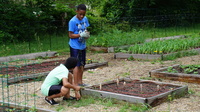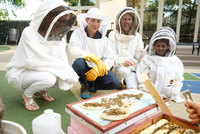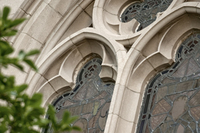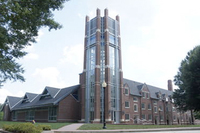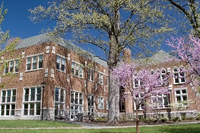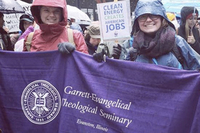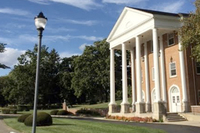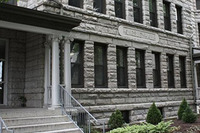Search
113 items
-
Earth Day Network
The Earth Day Network is an organization with a mission to diversify, educate, and activate the environmental movement. As they continue forward with their mission of building the world’s largest environmental movement, they recognize that faith leaders have been a driving force behind some of the most important social movements. They provide a plethora of resources to guide faith leaders and faith communities in their efforts of stewardship of the planet. -
Sustainable Weddings in Columbus
Weddings are typically large events to celebrate the union of two people. Regardless of how beautiful the celebration is, weddings can still generate a lot of waste. In fact, the average wedding can generate 500 pounds of trash. Recently, there has been a movement to have local sustainable weddings that cut environmental impacts significantly. -
Laudato Si’ in Columbus: Bishop Campbell Regales OSU Students with Historical Overview of Catholic Tradition
Bishop Campbell spoke to OSU students about Laudato Si', specifically regarding how Catholic tradition develops the context for it.
"Bishop Campbell highlighted four themes in his talk, including how Catholicism has considered nature for 2,000 years, a Catholic imagination of nature, historical trends of alienation from nature in the Western world, and a discussion of how sin – light and shadow of the world together – plays a role in our ecological situation."
Please click on the link below to view the entire article. -
Religion and Environment Songs: Mitakuye Oyasin by Nahko and Medicine for the People
Mitakuye Oyasin is a song by Nahko and Medicine for the People that relates to spirituality and nature. The phrase comes from the Lakota language and reflects the world view of interconnections held by the Lakota people of North America. The English translation is “we are all related.” The song lyrics start with being thankful for receiving great wisdom so that we as people can help all living things. The subsequent lyrics describe being thankful for all that we have been provided. -
Sisters of Earth: Hopes and Dreams
How to Face the Mess We’re in without Going Crazy is the subtitle of Joanna Macy’s book Active Hope. The book was the inspiration for the Sisters of Earth gathering that took place July 12-15, 2018 at Mount Saint Joseph, home of the Sisters of Charity in Cincinnati, Ohio. Cincinnati was chosen as the location partly because of the ancestral inspiration of Sister of Charity Paula Gonzalez, who promoted solar power and sustainability projects and teachings throughout the Catholic world. This year, nearly 100 women from the United States and Canada gathered, in part, to remember Sister Paula and also to address concerns about the ecological/spiritual crises of our times by asking questions such as: Who are we? Where are we? How did we get here and what is possible? And — where do we go from here? -
Environmental Statement – Reformed Church in America
In 1982, the Christian Action Commission of the Reformed Church in America (RCA) released a document titled “Care for the Earth: Theology and Practice.” This was given to General Synod, who then passed several resolutions outlining the Reformed Church in America’s stance on environmental issues. The Action Institute wrote the article below that discusses the resolutions that were passed. -
Seminary Hill Farm Community Supported Agriculture (CSA)
The Seminary Hill Farm website includes the following information on their community supported agriculture program:
"Transforming the traditional model of a CSA program, our program follows a new model that allows you to choose what items you would like week to week without having to commit to the entire season. Once the season begins, simply choose the items you would like to enjoy in your kitchen that week by visiting our website and meet us at one of our convenient locations to pick up your honestly fresh ingredients. We will have the items properly washed, packed and ready for you to take home and celebrate." -
Engaged Organizations: General Board of Global Ministries
General Board of Global Ministries discuss their vision and span of their work on their website. Their areas of impact run the gamut for a multitude of environmental and social justice issues:
"Connection is at the core of our work. Global Ministries connects The United Methodist Church, its people and congregations to partner with others engaged in God’s global work, which takes place in a variety of settings, countries and cultures.
Global Ministries works through missionaries and partners in more than 60 countries around the world. " -
The Charles Madison Narbit Memorial Garden
The Charles Madison Narbit Memorial Garden website states the purpose for it's creation:
"About the Garden: The Charles Madison Nabrit Memorial Garden
Named 2015 Community Garden of the Year and selected as one of 12 Hub Gardens in Central Ohio by Franklin Park Conservatory and Botanical Gardens, CMNMG@CCAF was created as a living legacy to Charles Madison Nabrit’s commitment to holistic health, self-determination, education and community service.
Our mission is to:
(1) increase affordable access to organic produce;
(2) increase awareness of the spiritual and cultural connections to gardening within black and brown communities;
(3) increase children’s exposure to functional STEM studies; and
(4) increase economic self-sufficiency and sustainability in the garden, in our homes and in our community.
Opened in 2014 in the midst of an urban food desert, CMNMG@CCAF is a 3,850 square foot, organic, biodiverse, self-sustaining space behind a church housing an historic, 105+ year-old, predominantly black congregation, descendents of the African diaspora to the Americas. Our hashtags speak to our spiritual and cultural heritage: #HeStartedUsinaGarden and #WeCameHeretoCultivate." -
Shepherd's Fest (Shepherd's Corner)
Shepherd's Corner ecological center provides information regarding their annual festival on their webpage:
"Explore our food pantry gardens, take a hayride around the property, meet our sheep, and walk the meditation trail & labyrinth. Savor delicious food from a local food truck (Moody Trudy). Meet the Jefferson Township fire department and check out a fire truck up close. Watch Gail Maraman, a local felt artist, demonstrate her art. Chat with AEP representatives about electricity savings, consider more responsible energy use with Columbia gas. and learn about the environmental efforts of Green Spot Columbus. We will have a farm stand featuring of our naturally grown produce, 2019 maple syrup, and crafts made by the Dominican Sisters of Peace and volunteers." -
Overview of grant application process for The Bee Cause Project
This link provides the document that serves as a resource to apply for The Bee Cause Project. The Bee Cause Project provides support for obtaining various bee hive options for K-12 schools.
Staff and students from St. Joseph Montessori School, Columbus, Ohio, worked together to apply for one of the grants offered. The students prepared a power point presentation about the bee hives. They also added their signatures on letters of support for their application to their local planning and zoning commission in order to build their bee yard. -
Engaged Organizations: The Shalom Center
The Shalom Center discusses their three major program priorities on their website:
"(1) Addressing the Global Climate Crisis, especially drawing on Jewish and other religious teachings about shaping a sustainable society; coping with the problems created by unacccountable concentrations of corporate and government power in making change difficult; and working on these issues with special concern for those most vulnerable and most hurt as the climate crisis unfolds.
(2) Addressing unjust and destructive concentrations of political and economic power in the hyper-wealthy and in giant global corporations — power that corrupts democracy, including elections, and delivers enormous “benefits” to those who wield the power while depriving the poor, the aged, the sick, Black and Latino and Native communities, much of the middle class, and large numbers of women of ways to meet their individual and social needs.
(3) Peacemaking, especially among the Abrahamic communities both within the USA and in the broader Middle East, where violence is especially intense and where it engages intense emotions in the overlapping circles of the Jewish community, the other Abrahamic communities, and the American public generally." -
Engaged Organizations: Interfaith Center for Sustainable Development
The Interfaith Center for Sustainable Development (ICSD) discusses their mission on their website:
"The Interfaith Center for Sustainable Development (ICSD) reveals the connection between religion and ecology and mobilizes faith communities to act. ICSD works on a global basis, with current engagement in Africa, the Middle East, North America, and Europe.
In 2020, ICSD’s work focuses on The Seminary Faith and Ecology Project. We are also continuing with The Faith Inspired Renewable Energy Project. ICSD also provides thought-leadership to faith-based communities and beyond through our writing, speaking, teaching and advocacy. Our collection of reports, articles, course and syllabus collections, blog, and other resources provide a unique access point for leaders and followers of faith-based communities alike to explore the connections between their tradition and contemporary environmental issues." -
Engaged Organizations: EcoSikh
EcoSikh began as an initiative of the United Nations Development Program https://www.undp.org/ and the Alliance of Religions and Conservation http://www.arcworld.org/. EcosSikh discusses their mission on their website:
"EcoSikh connects Sikh values, beliefs, and institutions to the most important environmental issues facing our world. We draw on the rich tradition of the Sikh Gurus and the Khalsa Panth to shape the behavior and outlook of Sikhs and the world, ensuring that our deep reverence for all creation remains a central part of the Sikh way of life."
The organization's main program is Sikh Environment Day, which includes a green pilgrimage network and a campaign to make gurdwaras more sustainable. -
Engaged Organizations: A Rocha International
A Rocha International discuss their mission on their website:
"At A Rocha USA, our mission is to restore both people and places through collaborative, community-based conservation.
We resource Christians to care for creation where they live by building a network of hands-on conservation projects in communities across the nation. Through partnerships with individuals, churches, and community groups, we provide content, curriculum, and a network of support for improving local habitats and increasing biodiversity." -
Engaged Organizations: Austin Presbyterian Theological Seminary
Austin Presbyterian Theological Seminary participates in the Green Seminary Initiative. In addition to their larger mission (as stated on their website at https://www.austinseminary.edu/), the GSI website describes their environmental efforts:
"Austin Presbyterian Theological Seminary has offered three faith-based environmental courses: “Environmental Ethics,” “Nature, Theology, and Ethics: Christian Spirituality and Creation Care,” and “Christian Creation and Spirituality.” These courses are taught by Dr. William Greenway, Associate Professor of Philosophical Theology. During his tenure at Austin, Dr. Greenway has taught several other faith-based environmental courses including "Nature, Theology, and Ethics" and an experiential course titled "An Adventure in Wilderness and Spirituality." In recent years, Austin has been steadily increasing its environmental commitments through its curriculum and communal worship. In joining the program, Austin brings cross-disciplinary faculty expertise, commitment to outdoor chapel services, and the implementation of an Energy Management System to reduce the school’s carbon footprint."
Austin Presbyterian Theological Seminary strives to infuse care of the earth into all aspects of theological education. -
Engaged Organizations: Boston University School of Theology
Boston University School of Theology participates in the Green Seminary Initiative. In addition to their larger mission (as stated on their website at https://www.bc.edu/content/bc-web/schools/stm.html), the GSI website describes their environmental efforts:
"Located in Boston, MA, Boston University School of Theology is a United Methodist seminary with broad ecumenical connections, including Episcopal and United Church of Christ Communities of Learning. BU has been actively working toward ecological justice since 2008, and built green initiatives into their strategic plan in 2010. BU brings to the Green Seminary Initiative an expertise in how to imagine what is possible as a theological school embedded in a large university that is also committed to ecological sustainability. They also exemplify what it means to transform curriculum and communal practice, and renovate aged buildings."
Boston University School of Theology strives to infuse care of the earth into all aspects of theological education. -
Engaged Organizations: Christian Theological Seminary
Christian Theological Seminary participates in the Green Seminary Initiative. In addition to their larger mission (as stated on their website at https://www.cts.edu/), the GSI website describes their environmental efforts:
"Christian Theological Seminary in Indianapolis, IN, is an ecumenical Christian theological institution. The school has nurtured ecological care in theological education through several course offerings, through courses taught by Dr. Marti Steussy and Dr. Carol Johnston, as well as a contextual study opportunity in Appalachia, offered by Dr. Suzanne Coyle. Dr. Robert Saler has published articles on environmental theology, while Dr. Carol Johnston, a long-time eco-theological leader in the Presbyterian Church (USA), has also published numerous books and articles and lectured internationally on religion and ecology. Dr. Felicity Kelcourse has supported community efforts to preserve Crown Hill a 30 acre pre-settlement remnant forest near the seminary that is threatened with deforestation."
Christian Theological Seminary strives to infuse care of the earth into all aspects of theological education. -
Engaged Organizations: Claremont School of Theology
Claremont School of Theological participates in the Green Seminary Initiative. In addition to their larger mission (as stated on their website at https://cst.edu/), the GSI website describes their environmental efforts:
"Claremont School of Theology in Claremont, CA, is a United Methodist Church seminary. Ecological sustainability has been a priority for the school since the tenure of Professor John Cobb, an early eco-theologian who began work at Claremont in 1960. Claremont held its first conference on the environmental crisis in 1971. The leaders of Claremont’s Green Team, Dr. Philip Clayton and Kristin Ritzau, shared with GSI that they see the certification process as a way to become a place of ecological education and empowerment for seminary leaders, students, and community members in Southern California. Claremont enters the program eager to share its curriculum and syllabi from multiple eco-classes and programs."
Claremont School of Theology strives to infuse care of the earth into all aspects of theological education. -
Engaged Organizations: Columbia Theological Seminary
Columbia Theological Seminary participates in the Green Seminary Initiative. In addition to their larger mission (as stated on their website at https://www.ctsnet.edu/), the GSI website describes their environmental efforts:
"Columbia Theological Seminary, a school in the Presbyterian Church (USA), has been a leader in ecological theological education for the last decade. They have two LEED Gold buildings on campus in Decatur, GA, was one of the founding members of the Seminary Stewardship Alliance, and their late president Steve Hayner began a Sustainability Commission that continues to this day. They also bring to the certification program a commitment to health, imagination, and resilience."
Columbia Theological Seminary strives to infuse care of the earth into all aspects of theological education. -
Engaged Organizations: Drew Theological School
Drew Theological School participates in the Green Seminary Initiative. In addition to their larger mission (as stated on their website at https://www.drew.edu/theological-school/), the GSI website describes their environmental efforts:
"Drew Theological School, a seminary of the United Methodist Church and part of Drew University in Madison, NJ, hosts The Green Seminary Initiative. Professor Laurel Kearns heads the Green Team, which also includes Dr. Catherine Keller and Dr. Heather Elkins on the faculty. All three publish, teach, and lecture on topics related to theology and eco-justice, joined by several other faculty who bring environmental concerns into their classes. Recently, eco-justice began to be integrated throughout the curriculum, building on almost two dozen courses with an ecological focus, including several required courses. Students can focus on religion and ecology in all degree programs. Drew’s other environmental initiatives include environmental justice field trips, native species and integrated pest management, water bottle refilling stations, reusable cutlery and sustainable food options. The campus includes a community garden, arboretum, labyrinth, native species planting, and a forest. The school is particularly proficient in establishing environmental policies to guide its institutional practices, and integrating environmental themes into chapel services, curriculum, speakers, cross-cultural trips, and broad social justice work."
Drew Theological School strives to infuse care of the earth into all aspects of theological education. -
Engaged Organizations: Garrett-Evangelical Theological Seminary
Garrett-Evangelical Theological Seminary participates in the Green Seminary Initiative. In addition to their larger mission (as stated on their website at https://www.garrett.edu/garrett-evangelical-theological-seminary), the GSI website describes their environmental efforts:
"Garrett-Evangelical Theological Seminary has offered five courses, taught by Assistant Professor of Theology and Ecology Dr. Timothy Eberhart, which incorporate ecological teachings into seminary education. A founder of the Seminary Stewardship Alliance (SSA), Garrett-Evangelical has been a leader in environmental education in Evangelical seminaries and is committed to integrating ecological perspectives and sustainable practices throughout the curriculum, the school’s worship, and spiritual life, programming, buildings and grounds, and administrative operations."
Garrett-Evangelical Theological Seminary strives to infuse care of the earth into all aspects of theological education. -
Engaged Organizations: Methodist Theological School in Ohio
Methodist Theological School in Ohio participates in the Green Seminary Initiative. In addition to their larger mission (as stated on their website at https://www.mtso.edu/), the GSI website describes their environmental efforts through the following excerpts:
"MTSO has a Sustainability and Land Initiative, which includes Seminary Hill Farm, a certified organic farm that makes it possible for MTSO to incorporate environmental learning into student life. This farm plays a prominent role in the school’s Ecology and Social Justice specialization."
"The Sustainability and Land Initiative seeks to further MTSO’s aspiration to 'prepare and invigorate transformational leaders to engage the church and the world in leadership and service' by creating a 'sustainable campus plan which establishes a model for theological education through the cultivation of sustainable teaching and learning communities on our land.' Current practices in sustainability include 90% of all food served in Dunn Dining Hall being sourced from organic and humane farms within 50 miles of campus, a Community Supported Agriculture (CSA) program, and commitments to urban farming partners in nearby Columbus. The campus has also installed geothermal heating/cooling and solar panels to power its administration and academic buildings."
Methodist Theological School in Ohio strives to infuse care of the earth into all aspects of theological education, including its offering of eight distinct religious-environmental courses. -
Engaged Organizations: Pacific Lutheran Theological Seminary
Pacific Lutheran Theological Seminary participates in the Green Seminary Initiative. In addition to their larger mission (as stated on their website at https://www.plts.edu/), the GSI website describes their environmental efforts:
"Pacific Lutheran Theological Seminary (PLTS) is a seminary of the Evangelical Lutheran Church in America, a graduate school of California Lutheran University, and a founding member of the Graduate Theological Union interfaith consortium in Berkeley, CA. PLTS decided to enter the Certification Program soon after their president Dr. Chris Kimball signed the Second Nature Climate Commitment, committing both the university and seminary to achieving carbon neutrality and developing strategies for resilience. PLTS has moved recently to a new urban campus in the heart of Berkeley, and is committed to exploring the relationships between earth care and justice issues of race, class, and gender."
Pacific Lutheran Theological Seminary strives to infuse care of the earth into all aspects of theological education. -
Engaged Organizations: The Samuel DeWitt Proctor School of Theology
The Samuel DeWitt Proctor School of Theology participates in the Green Seminary Initiative (GSI). In addition to their larger mission (as stated on their website at https://www.vuu.edu/theology), the GSI website discusses their environmental efforts:
"Located in Richmond, VA, the Samuel DeWitt Proctor School of Theology, Virginia Union University (STVU) has developed a commitment to ecology and theology in caring for creation which is rooted and grounded in the school's historical commitment to social justice, civil rights, and activism. STVU offers students the opportunity to engage ecological issues across many areas of its curriculum. As early as 2010, ecology was included as an important theological issue in required systematic theology courses."









